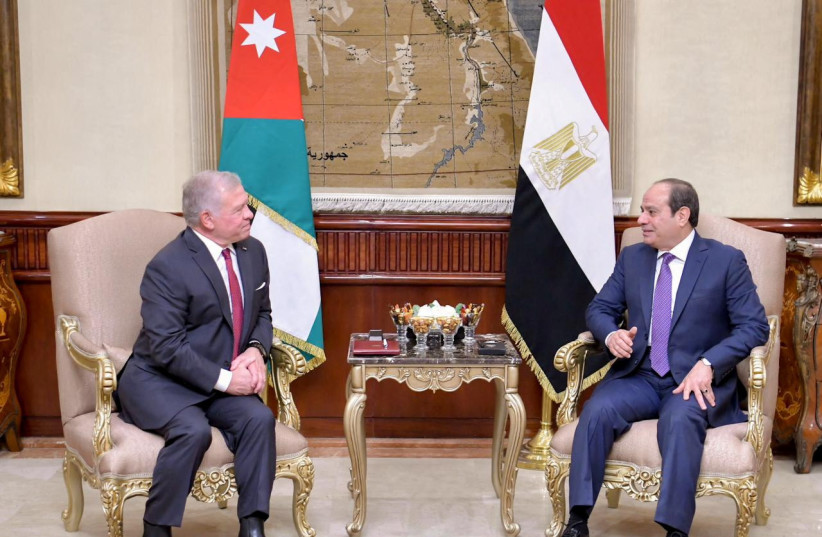Egyptian, Jordanian, and Palestinian leaders on Wednesday called for an immediate end to the Gaza war to avert a humanitarian crisis. They met in Aqaba while US Secretary of State Antony Blinken was on a weeklong regional trip.
The humanitarian assistance that entered Gaza since the start of the Israel-Hamas war has been “insufficient to adequately protect the people of Gaza from the severe humanitarian catastrophe,” Egyptian President Abdel Fattah al-Sisi said, according to a summary of the Jordan meeting published by his office.
Since the start of the war, much of the aid has entered Gaza through Egypt’s Rafah crossing, and Egypt has been heavily involved in the process.
Egypt and Qatar are attempting to mediate a hostage deal that they hope will pave the way for a permanent ceasefire.
Sisi, Palestinian Authority President Mahmoud Abbas, and Jordan’s King Abdullah discussed their redlines regarding the Gaza war and the Palestinian conflict, including the day after the war.
They agreed on the “unequivocal and categorical rejection” of any attempt to “liquidate the Palestinian issue” or to “forcibly displace Palestinian people outside their land,” Sisi’s spokesman Ahmed Fahmy said.

“They underscored their absolute dismissal of any attempts [by Israel] to reoccupy parts of Gaza” and were “reiterating the imperative need to enable the people of the sector to return to their homes,” he said.
The three leaders pledged their support for a Palestinian state along the pre-1967 borders, which included both Gaza and the West Bank.
They spoke after Abbas met with Blinken in Ramallah. Sky News in Arabic described the meeting as tense and contentious. The two men shook hands at the start of the meeting, but Blinken did not comment publicly on the conversation until he spoke with reporters in Bahrain.
Blinken did not comment on Abbas meeting until arrival in Bahrain
The US has backed Israel’s demand that Hamas cannot continue to govern or control Gaza after the war and that the PA must be reformed, including halting its monthly stipends to terrorists in Israeli jails and their families.
Israel has deducted that sum from the tax fees it collects and transfers to the PA. While in Tel Aviv, Blinken called on Israel to transfer all the funds, even though the US has opposed the monthly stipends, which Israel calls “pay for slay.”
Regarding his conversation with Abbas, Blinken said, “We talked as well about the importance of reforming the Palestinian Authority, Palestinian governance so that it can effectively take responsibility for Gaza – so that Gaza and the West Bank can be reunited under a Palestinian leadership.”
“It’s very clear to me from President Abbas that he’s prepared to move forward and engage in all of these efforts,” he said, reiterating his support for Palestinian statehood.
It’s “important for the Palestinian people that they have governance that can be effective, that can help deliver results for them, and I believe that President Abbas is committed to doing that,” Blinken said.
“When it comes to the broader path forward, as I said, even in this incredibly dark time, what’s so powerful in all our conversations... throughout this trip is that countries do see a way forward, a way forward through greater integration that provides real security for Israel and guarantees for that security and a pathway to a Palestinian state.
“Now, to get there, leaders have to make hard decisions, hard choices. We can’t do that for them,” Blinken said.
In Ramallah, Abbas reiterated to Blinken many of the points made in the Aqaba parley. He emphasized that the Gaza Strip is an “integral part of the Palestinian state” and that he rejected any plans to separate the two, according to a statement from his office, published by Wafa, the Palestine News Agency.
Abbas also spoke about the importance of releasing all the tax funds and creating a Palestinian state now, starting with unilateral recognition of Palestinian statehood, including recognition of Palestine as a United Nations member state.
Transforming the Palestinians from a nonmember state at the UN to a UN member state would require Security Council approval. So far, it has been expected that the US would veto all such requests.
